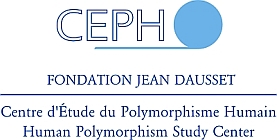«Pendant des siècles, la Médecine s’est préoccupée de soigner. Aujourd’hui elle s'est donnée comme but de prévenir plutôt que de guérir.»
Pr Jean Dausset, Prix Nobel de Médecine, 1980
Pr Jean Dausset, Prix Nobel de Médecine, 1980
La Fondation Jean Dausset - Centre d’Etude du Polymorphisme Humain participe aux efforts nationaux et internationaux de recherche pour mieux déterminer le rôle du polymorphisme génétique chez l’Homme, tout particulièrement dans les maladies complexes, pour mieux les comprendre, les diagnostiquer et participer au développement d’une médecine personnalisée.
CEPH History
|
The Centre d'Etude du Polymorphisme Humain (CEPH; Human Polymorphism Study Center) has been created in 1984 by Professor Jean Dausset (1980 Medicine Nobel price) and his collaborators: the Professors Daniel Cohen and Howard Cann and Doctor Mark Lathrop.  The goal of CEPH was to initiate and lead an international collaboration in order to establish the first genetic map of the human genome. To achieve this, a collection of DNAs from 40 large CEPH reference families has been made available to the scientific community. More than 120 collaborators were involved in the genotyping effort. The families' genotypic data have been gathered at CEPH and made available in a central database. This led to the building of more than ten genetic linkage maps of the whole human genome in the 1990s. In 1991, CEPH and AFM (Association Française contre les Myopathies) have created the Généthon, a research center in genetics. After the genetic mapping, the physical mapping of the human genome could then be achieved thanks to the large YAC (Yeast Artificial Chromosomes) libraries and their localisation, in collaboration with the Généthon. This program was directed by Professor Daniel Cohen. Genetic and physical maps as well as the availability of data to the scientific community have allowed many scientists (including some at CEPH) to localize genes responsible for Mendelian genetic diseases (e.g.: the localization of the Glucokinase gene involved in MODY-type diabetes by the team of Professor Froguel in 1991). The gene localization, first step that led to their cloning and identification, was the beginning of the era of medical genetics. The CEPH, under the lead of Jean Dausset and Daniel Cohen, has pioneered efforts in understanding complex phenotypes by initiating in 1991 the establishment of the first cohort of nonagenarians and centenarians in the world, in order to search for longevity-associated genes. CEPH has become in March 1993 a non-profit foundation : the Fondation Jean Dausset-CEPH. In the early 2000s, Professor Howard Cann collaborated with Professor Cavalli-Sforza from Stanford University (USA) to create the Human Genetic Diversity Panel-CEPH (HGDP-CEPH). The panel includes 1063 DNAs from 52 populations from all continents. Genetic material from the panel is distributed to researchers all over the world to be used in projects on different fields of population genetics. Studies performed at CEPH on Crohn's disease, under the direction of Professor Gilles Thomas, led in 2001 to the identification of CARD15/NOD2, the first gene reported to be involved in a multifactorial disease. The model of large international collaborations initiated by the CEPH since 1984 has been used in international projects such as the first human genome sequencing, the HapMap and 1000Genomes. The CEPH reference families panel is still used for genomic research such as 1000Genomes (as CEU population). Under the direction of Professor Mark Lathrop, the Fondation Jean-Dausset-CEPH has become a partner of the National Plan on Cancer Genomics launched in 2006 by French President Jacques Chirac. This programme coordinated by the French National Cancer Institute (INCa) led to the identification of genes involved in lung cancer. It also allowed the establishment of a collection of biological samples from about 10.000 breast cancer patients. The foundation was also involved in the National Alzheimer Plan launched in 2008 by French President Nicolas Sarkozy. This led to identification in 2009 of the CLU and CR1 genes associated with Alzheimer disease. Thanks to its biobank and its analysis platform, the Fondation Jean Dausset-CEPH is now involved in projects related to cancer and complex disease susceptibility factors. The projects on cancers include research on lung and breast cancers, renal carcinoma with the European FP7 project CAGEKID (Cancer Genomics of the Kidney) and bladder cancer with the French Programme d'Investissements d'Avenir COBLAnCE (Cohort for Bladder Cancer). The Foundation is also coordinating the French Excellence Laboratory program : GENMED (MEDical GENomics). Since December 2012, the foundation is directed by Doctor Jean-François Deleuze. Seminal publications in which CEPH was involved :
|
Donate to help our Research !













